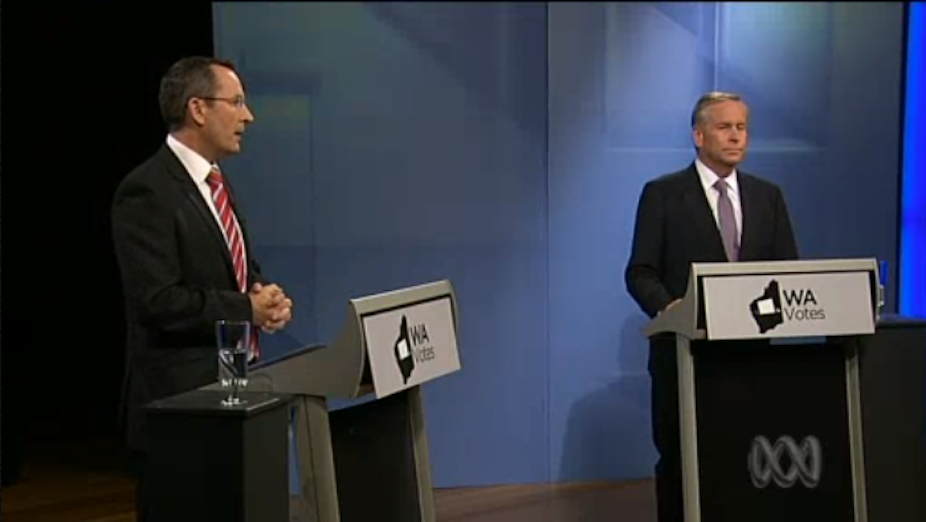Watching a political debate without the assistance of the worm can be difficult. Thankfully we have Twitter to provide us with indicators of the audience’s views. Even more useful is when party members start commenting. You know things aren’t going well when an MP, federal in this case, starts complaining about ABC bias:
The #ABC has some serious explaining to do about the shockingly low quality and uneven nature of the WA campaign debate broadcast! @MathiasCormann
Labor leader Mark McGowan appeared well prepared for his only opportunity to debate the Premier in the lead-up to the March 9 election. While Colin Barnett elected to face the panel and the audience sitting in the room, McGowan looked straight down the camera when answering his questions. This distinction led to Barnett looking distant, even unengaged, with his attention to the side of the camera, while McGowan appeared focused, speaking to the wider TV audience. The moderator, ABC newsreader James McHale, kindly suggested Barnett face the camera when delivering his final comments.
McGowan brought a number set pieces along to the debate, including the sound bite “Perth’s congestion crisis”, which is likely ringing true to anyone who has tried moving through the city during peak hour this week. The Labor campaign is built around METRONET, a significant expansion of the Perth rail system, with a very London Underground looking map. So, in addition to highlighting his proposals, McGowan was also keen to stress Barnett’s broken promise to extend the rail system to the outer suburb of Ellenbrook.

The panel’s surprisingly tough questions, which included interjections when the candidates went off-track, focused on infrastructure, state debt, cost of living, law and order and ministerial integrity. I assume I wasn’t the only person who guffawed at Barnett’s description of Treasurer Troy Buswell (yes, the chair sniffer) as “accident prone”. Regardless of Buswell’s talent as a Minister, McGowan would have hit the mark with many viewers when he pointed out that the behaviour exhibited by the Treasurer would have seen him dismissed rather than promoted in any other workplace environment. Further, the Premier completely ignored the “what message does it send to women” aspect of the question.
It wasn’t all smooth sailing for McGowan. In an effort not to cede the “tough on crime” mantle to the Premier, he refused to engage on the issue of mandatory sentencing, which may be popular with the average punter, but is not widely regarded as a viable solution to the issue of crime. Interestingly, McGowan only belatedly mentioned Sunday’s announcement of a sentencing council, which has received some support within the legal community.
McGowan was also repeatedly asked how he would reduce the significant level of state debt, approximately $18 billion, with $14 billion accrued over the term of the Barnett government. Other than “living within our means” it appears not a lot of thought has been put into bringing the level of debt down. When questioned, the Premier declared that debt would not be growing at the same rate over the next four years, but admitted it was unlikely to return to the level left by the Carpenter government.

Large increases in utility prices during the last four years have been an on-going issue with Western Australian voters. Previous governments had kept prices artificially low, and under the Barnett government electricity prices have risen by 62%. When questioned, Barnett denied that electricity prices would rise another 25% over the next four years, indicating that prices would generally rise in line with inflation. In many respects the worst of the pain is over when it comes to utility price increases, but McGowan is promising relief through the removal of the seven percent Tariff Equalisation Contribution levy.
With the benefit of incumbency, Barnett adopted a statesman like approach during his introductory and concluding statements, focusing on Western Australia’s importance to the region and his willingness to take on Canberra. McGowan chose a more local persona, highlighting his young family, and claiming to be in touch with the Western Australian community. He also capitalised on a member of the panel questioning Barnett on his perceived arrogance, providing a list of examples, including Barnett’s 2010 claim that air-conditioning wasn’t necessary in Perth, which an easier argument to make when you live in a leafy seaside suburb.
While McGowan won the night, and certainly presented himself as a credible alternative leader, Barnett’s performance was sound enough to ensure that he won’t suffer a negative turn in the eyes of the electorate similar to his 2005 “canal at any price” debacle.

